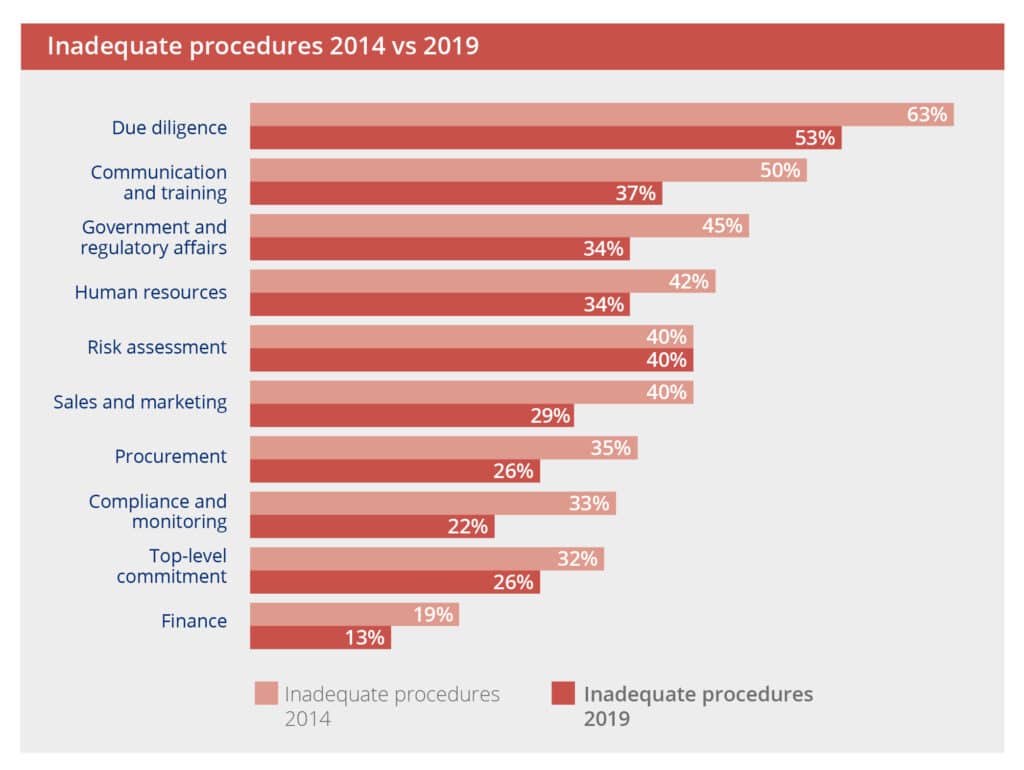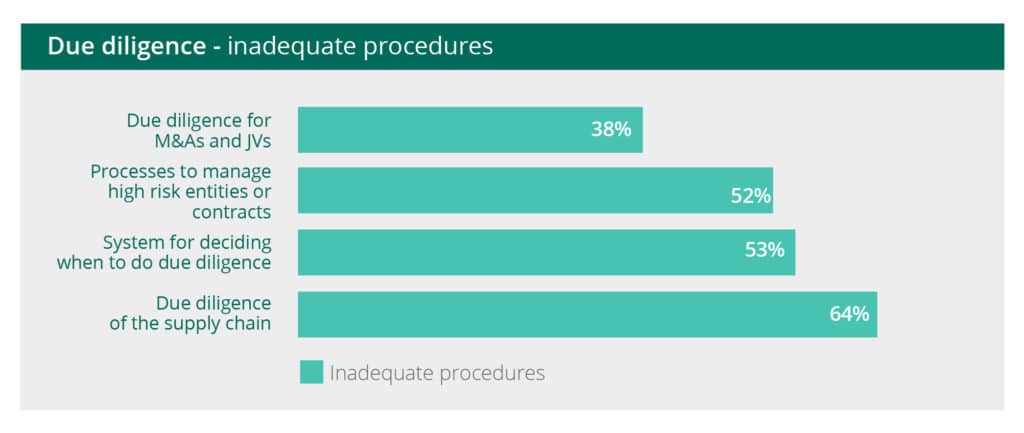Businesses remain at risk from corruption and prosecution as prevention measures remain inadequate
Press statements | read time: 2 min
Published: 8 December 2019

Businesses are failing to understand the corruption risks their organisations face and are still struggling to put the right anti-bribery practices in place according to data compiled by GoodCorporation.
- Just over half (53%) of the anti-bribery and corruption (ABC) due diligence controls assessed by GoodCorporation were graded inadequate
- Forty per cent of the ABC risk assessment procedures were found to be inadequate with no improvement in the five-year period from 2014 – 2019
- Almost one third (30%) of the of the 7,000 anti-corruption procedures assessed were inadequate, with a further fifth (22%) requiring some form of improvement.
These are just some of the findings in the latest paper Combating corruption: businesses still at risk, published by GoodCorporation, leading practitioners in measuring and assessing anti-corruption programmes. The paper contains an analysis of more than 7,000 anti-corruption procedures tested during anti-corruption assessments conducted for 100 leading national and international organisations since 2011.
Having adequate procedures to prevent corruption is vital, not only to mitigate the risk of bribery occurring, but also to ensure an effective defence, should prosecution arise. These findings suggest that too many companies are leaving themselves vulnerable to both bribery and prosecution.

Lack of ABC risk assessment exposes businesses to possible bribery
Any company that fails to identify and assess its exposure to specific bribery risks cannot be sure that its ABC programme is addressing the company’s bribery risks sufficiently. Consequently, such organisations are vulnerable to corruption and also limited in their ability to demonstrate an effective compliance programme as their line of defence, should they face prosecution.
Legislators, including the UK Ministry of Justice, US Department of Justice and the French Anti-corruption Agency (AFA) all state that organisations must understand their exposure to the risk of corruption in order to implement effective bribery prevention programmes.
Commenting, GoodCorporation director Gareth Thomas said; “In analysing risk, too many organisations simply state that corruption is a risk, without making any efforts to identify where or how it might occur. Consequently, any steps to prevent corruption are effectively compromised from the start. Over three quarters of the companies in the bottom quartile of our data have failed to conduct appropriate anti-bribery risk assessments, suggesting a lack of understanding of how to conduct bribery risk assessments in many organisations.”
Majority of ABC due diligence procedures continue to be inadequate
Due diligence of third parties remains the least adequate anti-corruption procedure, leaving companies vulnerable to bribery. As the prosecutions of Rolls-Royce, Vantage Drilling and Petrofac have shown, businesses are more at risk from corruption by third parties or intermediaries than in any other area of their business.
In over half of the assessments conducted there was no clear process for deciding which third parties needed due diligence checks, and in nearly two thirds of assessments, there were insufficient procedures for examining the practices of agents, intermediaries, suppliers and distributors.

For those companies in the bottom quartile, the position is even worse, with 89 per cent having inadequate systems in place for examining the ethical practices of suppliers or deciding when due diligence is required.
Gareth Thomas added; “Due diligence is one of the most challenging areas of anti-corruption prevention to implement. Any failure to get this right places companies in a vulnerable position. All too often we see organisations attempting to conduct due diligence across too many third parties which only ever provides superficial results. The best strategy is to start by identifying the entities that pose the greatest threat, taking a risk-based approach which will ensure that anti-corruption due diligence is proportionate and manageable.”
Commenting in the foreword, The Rt Hon Lord Woolf said; “the framework that GoodCorporation has established and the findings of this paper should be of considerable assistance to most companies seeking to protect their reputation.”
work with us
